Best Tires for Comfort and Noise
Finding the best tires for comfort and noise reduction is crucial for an enjoyable driving experience.
- Do your tires have a bad attitude?
- Do they constantly complain and throw temper tantrums, shrieking and howling every time you hit the road?
We feel your pain. Noisy, ill-tempered tires can turn your smooth ride into a nightmare on wheels.
But don’t worry – we have the inside scoop on how to give your tires a major attitude adjustment.
In this guide, you’ll discover the secrets to choosing tires that roll smoothly and quietly instead of angrily gripping the whole trip.
We’ll look at the key factors in choosing smooth-riding tires.
We’ll compare all-season, touring, and all-terrain tires and their tread patterns, analyze what impacts tire noise, and provide maintenance and noise reduction tips., and more so you can say goodbye to noisy tantrums and enjoy the peaceful ride you deserve.
Time to stop enduring grumpy, loud tires once and for all!
Let’s explore the best ways to help your tires chill out and make your driving experience quiet and serene again.
Table of Contents
Comparing Tire Types for Less Noise
When choosing tires that provide a quiet, comfortable ride, you’ve got options! Let’s break down the main tire types to decide which is best for your needs:
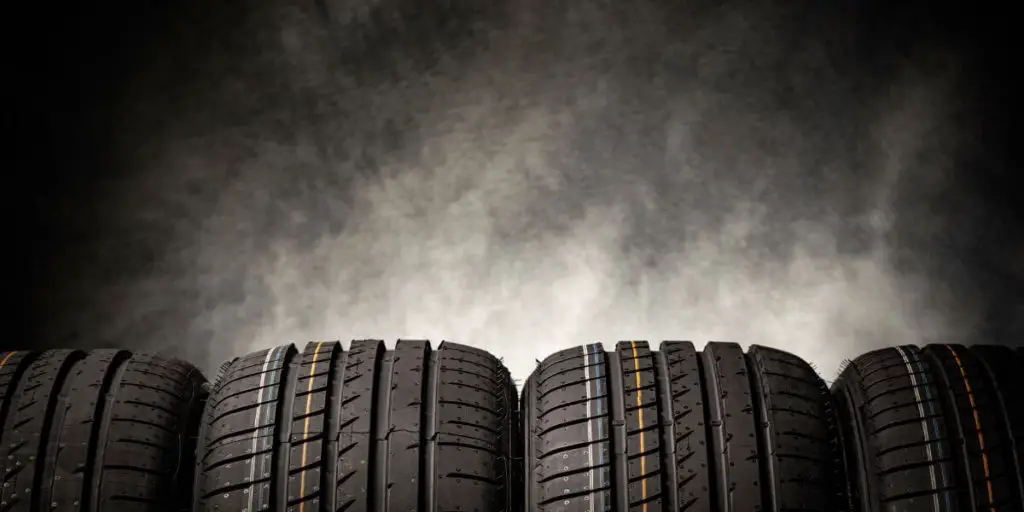
All-Season Tires
These are like the tennis shoes of the tire world – reliable, versatile, and great for everyday use. All-season tires prioritize comfort and help reduce tire noise, especially at highway speeds.
Their tread patterns are designed for low noise emission on paved roads.
The tread compound uses more silica to decrease rolling resistance. These tires offer most drivers the best smooth ride quality and long tread life.
Touring Tires:
If you do a lot of highway driving, touring tires are made for you! Optimized for high-speed comfort and minimal highway noise, these tires feature specialized tread designs and sidewall construction to absorb noise and vibration.
Touring tires provide little traction for snow or gravel, but their smooth, quiet ride is hard to beat!
All-Terrain/Off-Road Tires:
Now we’re talking adventure! If you frequently go off-roading or need maximum traction, all-terrain tires are the way to go.
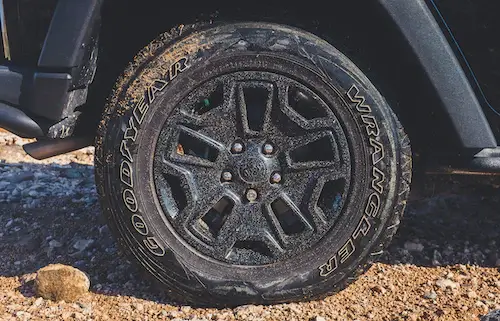
Their aggressive tread patterns and reinforced sidewalls grip through mud, dirt, snow, and gravel. The trade-off is they tend to be noisier on paved roads.
Plus, their durable construction sacrifices some comfort and ride quality.
Which tire type sounds like your perfect match? Keep these differences in mind as we dive deeper into choosing the best tires for your needs!
Best Tires for Your Vehicle Type
Beyond tire types, recommendations for the quietest, most comfortable tires also depend on your vehicle. Let’s break down the top options by these popular categories:
Sedans
For responsive handling and luxury rides, sedans need tires that prioritize comfort without sacrificing performance.
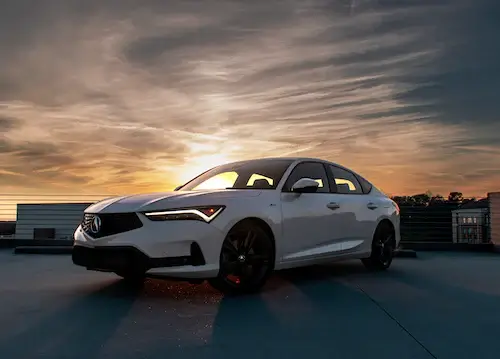
The best sedan tires include:
- Michelin Primacy Tour A/S – Delivers responsive handling and braking with a super quiet, smooth ride using Michelin’s Comfort Control technology.

- Continental PureContact LS – Optimized for comfort and reduced noise using EcoPlus technology. The Continental brand is renowned for its smooth performance.

- Goodyear Assurance MaxLife – Hard to beat for long tread life – up to 100,000 miles. It is great value while still providing a quiet, comfortable ride.
SUVs
The size and weight put more demands on tires, requiring durability and capability.
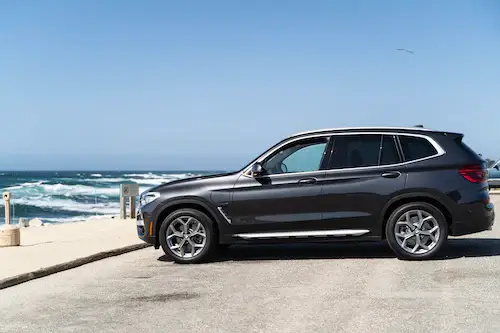
Top quiet SUV tire options include:
- Michelin Latitude Tour HP – Provides a cushy, quiet ride using Michelin’s Comfort Control and MaxTouch construction. Good traction in light snow.

- Bridgestone Dueler H/L Alenza Plus – Engineered for comfort with an all-season symmetric tread design. Handles well on wet roads.

- Pirelli Scorpion Verde All Season Plus II – Delivers low noise and a high 65,000-mile treadwear warranty. Good balance of on- and off-road traction.

For comprehensive information on the quietest SUV tires, read my latest article.
Trucks
Trucks need tires built to last to handle heavy loads and rugged conditions.
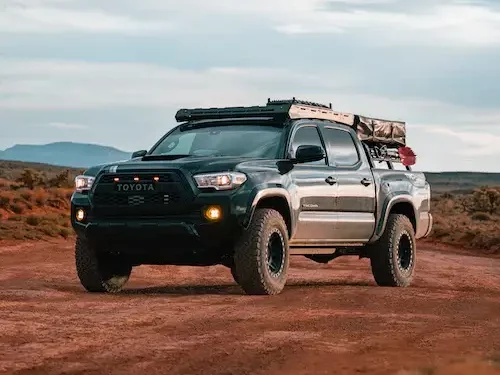
Quiet options that don’t sacrifice capability are:
- Goodyear Wrangler Fortitude HT – Hardy highway terrain tire optimized for long miles and comfort. Great value.

- Toyo Open Country Q/T – All-terrain option with quiet highway manners and toughness for off-road use. Excellent wet/snow traction.

- BFGoodrich Long Trail T/A Tour – Highway all-season tire with mud/snow rating. Known for long tread life and smooth, quiet rides.

Also, check my review about other useful truck accessories, like bed liners, bed covers and more.
Performance Cars
Sports cars demand responsive, grippy tires that handle high speeds and corners.

Look for:
- Michelin Pilot Sport All-Season 4 – Max performance with all-season versatility. Provides precise handling and steering response.

- Continental ExtremeContact DWS 06 Plus – Optimized for dry and wet grip while still quiet and comfortable around town.

- Goodyear Eagle Exhilarate – Delivers ultra-high performance with comfort from sound-absorbing foam.

With the right tires, you can maximize comfort and minimize noise in any vehicle. Let us know if you need help finding the perfect fit!
What Factors Impact Tire Noise?
Now that we’ve compared tire types let’s look at what design factors make some tires noisier than others while driving.
Understanding these key elements can help you choose the quietest tires possible!
Tread Pattern and Design
A tire’s tread pattern greatly affects noise levels. Symmetrical, consistent tread blocks tend to produce a droning sound, especially on the highway.
Tires with asymmetrical patterns and multiple pitch sequences help break up noise-creating vibrations.
Grooves that are narrower and have a rounded shape also roll more quietly than wide, angular slots. So, if you want lower noise, look for tread blocks and grooves that are irregularly sized and placed.
Tire Materials and Compound:
The specific rubber compounds used in tires impact noise, too. Compounds with more natural silica or carbon added create tires that run more quietly. The tradeoff is that softer compounds wear out faster.
But a softer, more malleable tread rubber absorbs more vibration and sound for pure noise reduction. Just be prepared for a potentially shorter tread life.
Quality of Road Surface
No matter how quiet your tires are designed, the condition of the road makes a big difference. Smooth asphalt allows tires to roll easily and quietly.
But rough pavement with grooves, bumps, and inconsistencies amplifies noise as tires roll over them.
Unfortunately, you can’t control the roads you drive on. But it helps explain why the same tires are louder on some surfaces.
Speed of Driving
The faster you drive, the more tire noise increases. Wind noise joins the mix at highway speeds over 50 mph, making tires seem especially loud.
Slower around-town driving typically produces less noise from your tires.
So, high-speed touring tires focus on design elements like continuous ribs and optimized compounds to decrease noise at highway speeds.
Let’s keep exploring other tire factors that affect noise and comfort! Understanding these key elements gives you the knowledge to purchase the smartest tire.
Choosing the Most Comfortable Tires
Now, let’s focus on how to pick tires that prioritize comfort and cushioning for the smoothest, most enjoyable ride.
Construction Materials
A tire’s comfort starts with the materials it’s made from. Softer rubber compounds absorb more vibration and flex better over bumps and cracks. The more natural silica added, the softer and more comfortable the ride.
Sidewalls play a role, too – tires with more flexible sidewalls dampen bumps better. And some add special cushioning layers under the tread for extra shock absorption.
Reduced Vibration
Small vibrations from the road transmit uncomfortable shaking and rattling over time. The best way to minimize vibration is to buy tires with rounder, more even tread depths and wear patterns.
When treads wear unevenly, they cause imbalance and vibration. So look for tires designed for even tread wear through siping and tread stiffness.
Responsiveness
Responsiveness describes how instantly a tire reacts to your steering and braking inputs. High-performance tires feel very responsive, but their stiff construction sacrifices comfort.
The most comfortable tires balance responsiveness and cushioning. Prioritize smoothness, then confirm tires still handle and corner responsibly.
Ride Quality
This catch-all term describes how enjoyable and quiet the tires make your drive. Key indicators are:
- Noise reduction systems using sound-dampening foams
- Shock absorption from flexible sidewalls and tread
- Minimal vibration on smooth and rough roads
- Responsiveness that avoids jittery handling
Now you know how to recognize comfortable, the best smooth-riding tires that fit your needs!
Best Tires For Comfort And Noise
Ready to look at some top-rated options for quiet, comfortable tires? Let’s highlight a few customer favorites:
Michelin Premier LTX
The Michelin Premier LTX delivers a quiet, smooth ride using Michelin’s Comfort Control Technology.
- Pros:
- Extremely quiet and comfortable on all roads
- Great responsiveness and handling
- Reduces vibrations and disturbances
- Cons:
- Lacking max snow/ice traction
- Expensive premium pricing
Continental PureContact LS
The Continental PureContact LS uses an eco-friendly silica tread compound and Comfort Ride technology for a dramatically quiet ride.
- Pros:
- Perhaps the quietest touring tire available
- Ultra-low noise, even at highway speeds
- Provides superior stability and handling
- Cons:
- Average snow and ice traction
- Can be pricey
Goodyear Assurance ComforTred Touring
The Goodyear Assurance ComforTred delivers advanced noise reduction for a peaceful ride.
- Pros:
- Impressively quiet at all speeds
- Very smooth, vibration-free ride
- Excellent value and longevity
- Cons:
- Adequate but not great snow/ice traction
- Less sporty handling than premium tires
Bridgestone Turanza QuietTrack
The Bridgestone Turanza QuietTrack uses ComfortCruise tech for an extremely quiet ride.
- Pros:
- Perhaps the quietest tire available
- ComfortCruise eliminates noise
- Excels on wet and dry roads
- Cons:
- Average snow and ice traction
- Handling less responsive than performance tires
| Tire Model | Key Features | Best For |
| Michelin Premier LTX | Comfort Control Tech, silica tread | Exceptional comfort and quiet |
| Continental PureContact LS | EcoPlus Tech, silica tread | Ultra-low noise |
| Goodyear Assurance ComforTred | Noise-reducing tech, ComfortLayer | Smooth, quiet value |
| Bridgestone Turanza QuietTrack | ComfortCruise Tech | Extreme noise reduction |
One of these top-rated tires will surely deliver the quiet, comfortable ride you want!
The Importance of Proper Tire Maintenance
To maximize the comfort, noise reduction, and longevity of your tires:
Proper tire maintenance is essential. Check tire pressure and tread depth monthly. Rotate tires every 5,000-8,000 miles.
Wheel alignment, balance, and rotation help prevent irregular wear that degrades ride quality over time.
Additional tips:
- Inspect tires thoroughly for cracks, punctures, or bulges
- Replace tires after six years, regardless of tread depth
- Choose tires sized appropriately for your vehicle
- Ensure mounting and balancing are done correctly
Proper care helps your tires last their full potential so you can continue enjoying a smooth, quiet ride.
Know the Risks of Driving on Damaged Tires
Driving underinflated, badly worn, or damaged tires is extremely hazardous:
Driving on one flat tire can cause the vehicle to pull, increasing the chances of losing control or a blowout. It also causes uneven wear on the drivetrain.
Additional risks include:
- Reduced braking and handling performance
- Increased chance of hydroplaning in wet conditions
- Potential tire failure, especially at highway speeds
- Decreased fuel economy
If a tire is underinflated, has insufficient tread depth, or shows signs of damage, replace it immediately. Your safety depends on it.
The Best Tires Provide Comfort and Reliability
We depend on our vehicles daily to get where we need to go. Choosing tires optimized for comfort and quiet operation makes every drive more relaxed and enjoyable.
For supreme comfort and noise reduction:
- Prioritize cushioning, ride quality, and minimal road noise
- Consider all-season vs all-terrain depending on your needs
- Choose an appropriate speed rating for your vehicle
- Verify quality construction and compounds
- Check warranties for coverage of treadwear and performance
With proper maintenance and care, the best tires offer many miles of tranquil travel. Safe journeys!
Frequently Asked Questions
What tread patterns make the quietest tires?
Look for asymmetric tread patterns with varying pitch sequences and block sizes. These break up noise-causing vibrations. Narrower grooves with rounded corners also roll more quietly.
Do softer tire compounds wear out faster?
Yes, the softer rubber compounds that reduce noise typically wear faster. Prioritize comfort and noise, then plan more frequent tire replacements. Or consider harder compounds if you want extended tread life.
Are touring tires the quietest?
Touring tires are specially engineered for quiet performance, especially at high speeds. But all-season and highway tires have also improved noise reduction using sound-dampening tech. Any can be quiet, depending on the design.
How much does tire inflation impact noise?
Underinflation is a major cause of increased noise and vibration. Proper inflation pressures keep tires rolling smoothly and quietly. Always maintain the recommended PSI.
Can new tires be noisy at first?
New tires often require a brief break-in period to reach optimum noise levels. As the tread wears slightly, noise decreases. Give them a few hundred miles to quiet down.
Do wider tires lead to more noise?
Yes, wider tires have more tread contact area touching the road, which creates more noise. Stick with manufacturer-recommended widths to balance noise, performance, and comfort.
How often should I rotate tires?
Most experts recommend a tire rotation every 6,000-8,000 miles. This prevents uneven wear that causes vibration and noise. Follow the rotation pattern specified for your vehicle.
What causes vibration in tires?
Common culprits are uneven tread wear, wheel imbalance, and loose lug nuts. Proper tire maintenance and alignment help eliminate vibration-causing imbalances.
Do all-season tires provide a comfortable ride?
The best all-season tires prioritize comfort through optimized tread patterns and cushioning compounds. All-season doesn’t have to mean rough or loud.
How do I find the best tires for my vehicle?
Start by checking manufacturer recommendations. Then, read reviews and look for tires that align with your priorities – comfort, performance, value, or versatility.
Have more questions? Reach out anytime! We’re here to help you understand everything about finding the most comfortable, quietest tires for your needs.
Conclusion
We’ve given you all the insider tips on choosing comfortable, quiet tires so you can glide down the road instead of rattling and rumbling.
Now, it’s time to put this knowledge into action!
Here are three simple next steps:
⏱️ Schedule a tire inspection to see if it’s time to replace your current set
🔎 Browse top-rated quiet tires and read reviews to find your perfect match
💬 Reach out to us with any questions to get personalized recommendations
Driving should be relaxing – not a noisy, bumpy battle with your tires. We’re here to help you upgrade to the peaceful cabin comfort you deserve.
Let us help you find your new favorite tires!







